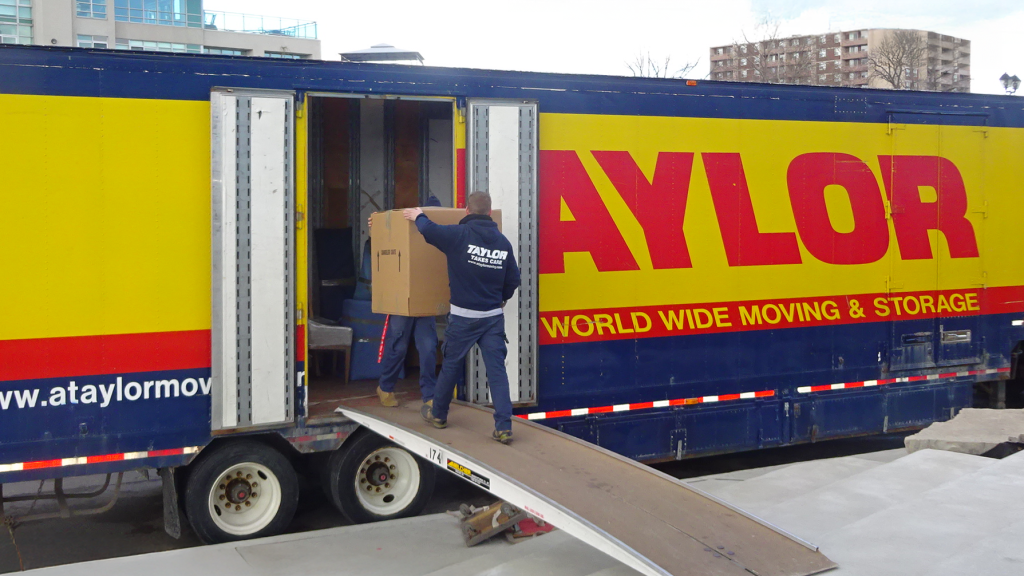
International Moving between Canada and Spain
Moving overseas to or from Canada and Spain? Learn more about packing, shipping, and customs to make your international relocation stress-free.
Planning Your Move
The first step in your international move is a tailored assessment of your needs. You can complete our AI-powered survey or meet with our consultants via Zoom, Google Meet, or in person. During this consultation, we’ll determine your packing requirements, customs considerations, and other key details.

Why Choose Taylor International?
We offer flexible, high-quality moving solutions through our extensive supply chain. As members of the International Association of Movers (IAM) and Fédération Internationale des Déménageurs Internationaux (FIDI), we provide access to a vast global network, ensuring reliable service with backup options for a seamless transition.
- Premium Service: Our FIDI-certified partners offer top-tier care.
- Budget-Friendly Options: IAM-certified movers provide reliable, cost-effective solutions.
- Balanced Approach: We customize packages to match your priorities.
- Diversified Supply Chain: No matter the option selected in the event of a major issue, we have back-up plans to ensure your move is performed with your customized plan.
- Extensive 3rd Party Partnerships: Our network also encompasses a vast array of 3rd party services from appliance disassembly, gym disassembly and other critical expert assistance to ensure your items are protected.
- Robust Cybersecurity: Our methods, procedures and systems enable your most sensitive information to be secure.
- Customs Mastery: Our international move managers work with you to ensure that you can navigate the complexities of customs, imports, exports and local regulations with the upmost care.
- Comprehensive Insurance: Taylor International provides full replacement value so you do not need to worry about the what ifs and instead focus on the will bes when you get to your destination. We will also source any services needed to render this service globally.
Our strict vetting process ensures only top-performing providers handle your shipment. If a supplier doesn’t meet our standards, they’re removed from our network—your satisfaction is our priority.
Choosing the Right Shipping Method
We help you select the most efficient transport option:

Sea Freight
The most economical choice for most moves.

Air Freight (LTL)
Faster delivery at a premium.

Hybrid Solutions
Essential items arrive by air, with the rest shipped via sea.
No matter your budget, we’ll find the best option for you.
Your Moving Journey
After your consultation, our specialists create a personalized moving plan and provide a detailed quote. Once confirmed, a dedicated moving coordinator will manage the process, ensuring smooth navigation of documentation, customs, and compliance requirements—avoiding delays or unexpected fees.
Relocating from Canada to Bilbao offers an exciting opportunity to live in one of Spain’s most dynamic and culturally rich cities. As the economic hub of the Basque Country, Bilbao combines stunning natural landscapes, world-class architecture, and a high quality of life. Known for its innovative urban development, Michelin-starred cuisine, and strong regional identity, the city provides a unique and rewarding experience for expats. However, proper planning is essential to ensure a smooth transition.
Visa and Residency Requirements
Canadians moving to Bilbao for more than 90 days will need a visa. The most common options include:
- Work Visa – Sponsored by a Spanish employer, allowing you to work and live legally.
- Non-Lucrative Visa – Designed for retirees or remote workers who can demonstrate financial self-sufficiency.
- Student Visa – Required for those enrolling in a university or specialized training program.
Upon arrival, you must apply for a Foreigner Identity Card (TIE) within 30 days and register with the local padrón for access to healthcare, banking, and other administrative services.
Finding Housing in Bilbao
Bilbao offers a range of housing options, from modern apartments to historic buildings. Popular neighborhoods for expats include:
- Abando – The city’s commercial center, ideal for professionals who want to be close to business districts and high-end amenities.
- Indautxu – A vibrant area with a mix of shopping, nightlife, and residential properties.
- Casco Viejo – The historic heart of the city, offering a charming old-town atmosphere with traditional Basque culture.
- Deusto – A quieter area close to the University of Deusto, popular among students and academics.
Rental contracts usually require a deposit of one to three months’ rent, and some landlords may ask for a Spanish bank account for payments.
Banking and Finances
Opening a Spanish bank account is highly recommended to simplify rent payments and daily transactions. Most banks require a NIE (Número de Identificación de Extranjero), proof of address, and financial documentation. International transfers can be costly, so using digital banking services like Wise or Revolut can help reduce fees.
Healthcare and Insurance
Spain has a top-tier public healthcare system, and those employed in Bilbao will automatically be covered under Seguridad Social. Retirees, self-employed individuals, and non-working residents may need private health insurance. Bilbao has several high-quality healthcare facilities, including Hospital Universitario de Basurto and IMQ Zorrotzaurre.
Cultural and Daily Life Adjustments
Bilbao has a unique cultural identity, deeply rooted in Basque traditions, which differ from other Spanish regions. While Spanish is widely spoken, Euskara (Basque) is also an official language, and learning a few phrases can help with integration.
The cost of living in Bilbao is lower than in Madrid or Barcelona but higher than in smaller Spanish cities. The city’s public transportation system is efficient, with metro, trams, and buses providing easy access to different areas.
Settling In
To ease your transition, consider joining expat groups, participating in cultural events, or taking Spanish and Basque language classes. Destination service providers can assist with visa processing, housing searches, and school enrollment for families.
With its blend of modernity and tradition, excellent quality of life, and stunning natural surroundings, Bilbao offers a fantastic relocation opportunity for Canadians seeking a dynamic and welcoming European city.
Relocating from Canada to Valencia offers an exciting opportunity to experience a city that blends Mediterranean charm with modern conveniences. As Spain’s third-largest city, Valencia is known for its vibrant culture, stunning beaches, and lower cost of living compared to Madrid or Barcelona. Whether you are moving for work, retirement, or study, careful planning will ensure a smooth transition.
Visa and Residency Requirements
Canadians moving to Valencia for more than 90 days will need a visa. The most common options include:
- Work Visa – Requires sponsorship from a Spanish employer.
- Non-Lucrative Visa – Suitable for retirees and remote workers who can prove financial independence.
- Student Visa – For those enrolling in Spanish universities or language programs.
Upon arrival, you must apply for a Foreigner Identity Card (TIE) within 30 days and register with the local padrón for access to healthcare, banking, and public services.
Finding Housing in Valencia
Valencia offers diverse housing options at a lower cost than other major Spanish cities. Popular neighborhoods for expats include:
- El Carmen – A historic district with vibrant nightlife and cultural attractions.
- Ruzafa – A trendy, artsy neighborhood with international restaurants and cafes.
- El Cabanyal – A charming seaside area near Malvarrosa Beach, ideal for those who love coastal living.
- Benimaclet – A student-friendly and bohemian neighborhood with a strong community feel.
Rental agreements typically require a deposit of one to three months’ rent. Some landlords may ask for a Spanish bank account for payments.
Banking and Finances
Opening a Spanish bank account is highly recommended for paying rent and managing daily expenses. Most banks require a NIE (Número de Identificación de Extranjero), proof of address, and financial documentation. To save on international transfer fees, consider using digital banking services like Wise or Revolut.
Healthcare and Insurance
Spain’s public healthcare system is excellent, and those working in Valencia are automatically covered under Seguridad Social. However, retirees, remote workers, and non-employed residents must arrange private health insurance. Valencia has several highly rated private hospitals, such as Hospital IMED Valencia and Hospital Casa de Salud.
Cultural and Daily Life Adjustments
Valencia offers a relaxed Mediterranean lifestyle, with long lunches, late dinners, and frequent festivals. The cost of living is lower than in Madrid or Barcelona, making it an attractive option for expats. Public transport, including buses, trams, and the metro, is efficient and well-connected. Cycling is also popular, thanks to the city’s bike-friendly infrastructure.
While Spanish is the primary language, Valencian (a Catalan dialect) is also spoken, especially in official settings and schools. Learning basic Spanish will help with integration.
Settling In
Joining expat communities, attending local events, and taking Spanish classes can ease your transition. Destination service providers can assist with bureaucratic processes, home searches, and school enrollment for families.
With its warm climate, rich culture, and affordable lifestyle, moving from Canada to Valencia is a rewarding experience for those seeking a balance between city living and coastal relaxation.
Relocating from Canada to Seville offers an opportunity to experience the charm of Andalusia’s capital, a city rich in history, flamenco culture, and a relaxed Mediterranean lifestyle. Seville is known for its warm climate, stunning architecture, and lower cost of living compared to Madrid or Barcelona, making it an attractive destination for expats, retirees, and remote workers. However, settling in requires careful planning, from visa applications to housing and cultural adaptation.
Visa and Residency Requirements
Canadians planning to stay in Seville for more than 90 days will need a visa. The most common options include:
- Work Visa – Requires a job offer from a Spanish employer, who will sponsor your visa application.
- Non-Lucrative Visa – Ideal for retirees or remote workers who can demonstrate financial independence.
- Student Visa – Required for those enrolling in Spanish universities or language programs.
Upon arrival, you must apply for a Foreigner Identity Card (TIE) within 30 days and register with the municipal padrón, which is essential for healthcare access, banking, and other administrative needs.
Finding Housing in Seville
Seville’s housing market is more affordable than other major Spanish cities. Popular neighborhoods for expats include:
- Triana – A historic district known for its flamenco culture and traditional tapas bars.
- Nervión – A modern area with shopping centers, parks, and good transport links.
- El Centro – Ideal for those who want to live in the heart of the city, close to landmarks like the Cathedral and Alcázar.
- Los Remedios – A quieter, residential area popular with families and professionals.
Rental contracts typically require one to three months’ rent as a deposit, and some landlords prefer tenants with a Spanish bank account.
Banking and Finances
Opening a Spanish bank account is advisable for rent payments and daily transactions. Most banks require a NIE (Número de Identificación de Extranjero), proof of address, and financial documentation. Since international bank transfers can be costly, consider using digital banking services like Wise or Revolut to minimize fees.
Healthcare and Insurance
Spain has a high-quality public healthcare system, and those employed in Seville are automatically covered under Seguridad Social. However, retirees, remote workers, and non-employed residents may need private health insurance. Seville has several well-regarded private hospitals, including Hospital Quirónsalud Infanta Luisa and Hospital Viamed Santa Ángela de la Cruz.
Cultural and Daily Life Adjustments
Seville is known for its siesta culture, with many businesses closing in the afternoon and reopening in the evening. The city has a slower pace of life compared to Madrid and Barcelona, which can take time to adjust to. The cost of living is lower, making dining out and entertainment more affordable. Public transportation is reliable, with buses, trams, and bicycles widely used, though many residents prefer walking in the compact city center.
While Spanish is the primary language, Andalusian Spanish has a distinct accent, which may require some adjustment for non-native speakers. Learning basic Spanish will help with day-to-day interactions.
Settling In
Joining expat groups, attending cultural events, and taking Spanish classes can help ease your transition. Destination service providers can assist with visa paperwork, housing searches, and school enrollment if relocating with family.
With its rich cultural heritage, warm climate, and welcoming atmosphere, moving from Canada to Seville can be a fulfilling experience for those looking to embrace a relaxed, authentic Spanish lifestyle.
Relocating from Canada to Madrid is an exciting adventure, offering a mix of rich history, vibrant city life, and a warm climate. As Spain’s capital, Madrid is a hub for business, culture, and entertainment, making it an attractive destination for professionals, students, and retirees. However, moving to a new country requires careful planning, from visa applications to housing and daily life adjustments.
Visa and Residency Requirements
If you plan to stay in Madrid for more than 90 days, you’ll need a visa. The most common types for Canadians include:
- Work Visa – If you have a job offer from a Spanish employer, they will sponsor your visa.
- Non-Lucrative Visa – Ideal for retirees or remote workers who can prove financial independence.
- Student Visa – For those enrolling in a Spanish university or training program.
Once in Spain, you must apply for a Foreigner Identity Card (TIE) within 30 days of arrival and register with the municipal padrón, which is essential for healthcare, banking, and other administrative processes.
Finding Housing in Madrid
Madrid’s real estate market is diverse, offering everything from modern apartments to historic homes. Popular neighborhoods for expats include Salamanca (luxury living), Chamberí (traditional charm), Retiro (family-friendly), and Malasaña (vibrant nightlife and arts scene). Rental agreements typically require a deposit of one to three months’ rent, and some landlords prefer tenants with a Spanish bank account.
For those moving with families, proximity to international schools such as the American School of Madrid or International College Spain is an important consideration.
Banking and Finances
Opening a Spanish bank account simplifies rent payments and everyday transactions. Most banks require a NIE (Número de Identificación de Extranjero), proof of address, and employment or financial documentation. International transfers can be expensive, so consider digital banking services like Wise or Revolut to minimize fees.
Healthcare and Insurance
Spain has an excellent public healthcare system, and employed residents contribute to Seguridad Social, granting them access to public healthcare services. However, expats who are self-employed, retirees, or awaiting residency registration may need private health insurance. Madrid has several top-rated private hospitals, such as Hospital Ruber Internacional and Hospital Universitario La Paz.
Cultural and Daily Life Adjustments
Madrid’s lifestyle is a blend of work and leisure, with long lunch breaks, late dinners, and a strong emphasis on social life. The city has an efficient public transportation system, including an extensive metro network, buses, and commuter trains. While Spanish is the primary language, learning some basic phrases can greatly improve your experience.
Settling In
To ease your transition, consider joining expat groups, attending networking events, or taking Spanish classes. Destination service providers can assist with bureaucratic processes, home searches, and school enrollments, making your move smoother and less stressful.
With proper preparation, moving from Canada to Madrid can be a seamless experience, allowing you to enjoy the city’s rich culture, world-class dining, and dynamic urban lifestyle.
Relocating from Canada to Barcelona is an exciting journey filled with cultural discoveries, stunning architecture, and a Mediterranean lifestyle. However, the process involves several important considerations, from visa requirements to housing and daily life adjustments. Whether you’re moving for work, study, or retirement, preparing ahead of time can ensure a smooth transition.
Visa and Residency Requirements
Canadians moving to Barcelona for more than 90 days will need a visa. The most common options include the Non-Lucrative Visa (for retirees or remote workers with independent income), the Work Visa (sponsored by an employer), and the Student Visa (for those enrolled in a university or training program). Upon arrival, you must apply for a Foreigner Identity Card (TIE) at the local immigration office and register with the municipal “padrón” to access healthcare and other services.
Finding Housing in Barcelona
Barcelona’s real estate market is competitive, so securing accommodation in advance is highly recommended. Many expats start with temporary housing and then look for a long-term rental. The Eixample, Gràcia, and Sarrià-Sant Gervasi neighborhoods are popular among international residents due to their safety, amenities, and connectivity. Rental agreements typically require a deposit equivalent to one to three months’ rent, and many landlords request a Spanish bank account for payments.
Banking and Finances
Opening a Spanish bank account simplifies bill payments and salary deposits. Most banks require a NIE (Número de Identificación de Extranjero), proof of address, and employment or income documentation. International transfer fees can add up, so using digital banking services like Wise or Revolut can help reduce costs.
Healthcare and Insurance
Spain has an excellent public healthcare system, but expats may need private insurance, especially while waiting for residency registration. If you are employed, you will automatically be covered under Seguridad Social, but self-employed individuals and retirees should arrange private coverage.
Cultural and Daily Life Adjustments
Barcelona offers a vibrant lifestyle, but cultural adaptation is essential. Learning some basic Catalan or Spanish can enhance daily interactions. The work culture may feel more relaxed than in Canada, with long lunch breaks and later business hours. The public transport system is efficient, with metros, buses, and trams providing easy access to different parts of the city.
Settling In
Once you’ve moved, joining expat communities, networking events, or language exchange programs can ease your integration. Professional destination service providers can assist with bureaucratic processes, home searches, school enrollments for children, and general city orientation.
With the right preparation, moving from Canada to Barcelona can be a seamless experience, allowing you to embrace the city’s rich history, culinary scene, and Mediterranean charm.
Moving from Spain to Vancouver offers an exciting opportunity to experience one of Canada’s most vibrant and picturesque cities. With its stunning natural surroundings, diverse culture, and strong job market, Vancouver is an attractive destination for newcomers. However, adjusting to life in this West Coast metropolis requires careful planning, particularly in terms of housing, cost of living, and cultural adaptation.
Visa and Immigration Requirements
Spanish citizens can visit Canada without a visa for short stays, but a work permit, study permit, or permanent residency is necessary for long-term relocation. The Express Entry system is a popular route for skilled professionals, while employer-sponsored visas and the British Columbia Provincial Nominee Program (BC PNP) provide alternative immigration options for those looking to settle permanently in Vancouver.
Finding a Place to Live
Vancouver is known for its high cost of living, particularly in housing. Many newcomers start by renting apartments or condos before considering homeownership. Popular neighborhoods for expatriates include Yaletown for its modern high-rises, Kitsilano for its beachside charm, and Mount Pleasant for a more artsy, community-oriented atmosphere. If affordability is a concern, consider suburban options like Burnaby, Richmond, or Coquitlam, which offer more spacious housing and access to public transit.
Healthcare and Insurance
British Columbia has a publicly funded healthcare system, and new residents should apply for the Medical Services Plan (MSP) upon arrival. There is typically a three-month waiting period before coverage begins, so private health insurance is recommended for the initial transition period.
Cost of Living and Banking
Vancouver is one of the most expensive cities in Canada, with high housing, transportation, and food costs. However, the absence of provincial sales tax on groceries helps mitigate some expenses. Setting up a local bank account with major institutions like RBC, TD, or Scotiabank is essential for managing day-to-day financial transactions.
Adapting to Life in Vancouver
Vancouver is a multicultural city with a welcoming expatriate community. Spanish speakers can find cultural organizations, language exchange meetups, and specialty grocery stores offering familiar foods. Outdoor enthusiasts will appreciate Vancouver’s proximity to mountains, beaches, and parks, making it an ideal destination for hiking, skiing, and water sports. While the city’s rainy winters can be an adjustment, Vancouver’s mild climate compared to other Canadian cities makes it a comfortable place to live year-round.
With thorough preparation and an open mindset, relocating from Spain to Vancouver can be a seamless transition, allowing you to enjoy all the benefits of one of Canada’s most dynamic and livable cities.
Moving from Spain to Edmonton is an exciting transition that offers a blend of urban convenience, natural beauty, and economic opportunity. As the capital of Alberta, Edmonton is known for its affordable housing, strong job market—especially in energy, healthcare, and technology—and a high standard of living. Whether you are relocating for work, study, or family, planning ahead will make the move easier and more enjoyable.
Visa and Immigration Requirements
Spanish citizens can visit Canada without a visa for short stays, but for long-term relocation, a work permit, study permit, or permanent residency is required. Many skilled professionals use Canada’s Express Entry system, while employer-sponsored visas and the Alberta Immigrant Nominee Program (AINP) offer additional pathways for those looking to settle in Edmonton permanently.
Finding a Place to Live
Edmonton offers a more affordable cost of living than cities like Toronto or Vancouver, making it an attractive destination for newcomers. Renters and homebuyers alike will find diverse housing options, from modern downtown apartments to suburban family homes. Popular neighborhoods include Strathcona, known for its arts and nightlife scene, Oliver for its central location, and Windermere for a more suburban feel with newer developments. If you prefer a quieter, family-oriented environment, consider St. Albert, a neighboring community with excellent schools and amenities.
Healthcare and Insurance
Newcomers to Alberta can apply for the Alberta Health Care Insurance Plan (AHCIP), which provides free public healthcare. However, since there may be a waiting period before coverage begins, securing private health insurance for the initial months is recommended.
Cost of Living and Banking
Edmonton is one of Canada’s more affordable major cities, with lower housing costs and no provincial sales tax. Opening a Canadian bank account with institutions like RBC, TD, or Scotiabank will be essential for managing finances, setting up direct deposits, and building a credit history.
Adjusting to Life in Edmonton
Edmonton has a growing Spanish-speaking community, and newcomers can find cultural organizations, language exchange programs, and international grocery stores offering Spanish products. The city’s vibrant arts and festival scene, including events like the Edmonton International Fringe Festival and K-Days, provide great opportunities for cultural immersion. While winters can be cold, Edmonton’s extensive indoor facilities, winter festivals, and community spirit make it easier to adapt.
With proper planning and an open mindset, your transition from Spain to Edmonton can be smooth and rewarding, allowing you to enjoy all the benefits this dynamic Canadian city has to offer.
Relocating to Calgary from Spain presents an exciting opportunity to experience a new culture, stunning landscapes, and a high quality of life. As one of Canada’s fastest-growing cities, Calgary offers a strong job market, affordable housing compared to other major Canadian cities, and an excellent standard of living. Whether you are moving for work, study, or a new adventure, proper planning will ensure a smooth transition.
Visa and Immigration Requirements
Before making the move, ensure you have the correct immigration status. Spanish citizens can visit Canada visa-free for up to six months but will need a work permit, study permit, or permanent residency for long-term relocation. The Express Entry system is the fastest route for skilled workers, while employer-sponsored visas and the Alberta Immigrant Nominee Program (AINP) provide alternative pathways to residency.
Finding a Place to Live
Calgary offers a more affordable housing market than Toronto or Vancouver. Many newcomers choose to rent an apartment or house before committing to a purchase. Popular neighborhoods for expatriates include Beltline, Kensington, and Bridgeland, which offer a vibrant lifestyle with easy access to public transit, restaurants, and cultural attractions. If you prefer a quieter, family-friendly setting, consider suburban areas like Signal Hill or Tuscany.
Healthcare and Insurance
Alberta provides a publicly funded healthcare system, and new residents can apply for the Alberta Health Care Insurance Plan (AHCIP). There may be a waiting period before coverage begins, so private health insurance is recommended for the initial months.
Cost of Living and Banking
Calgary is known for its relatively low cost of living, especially in housing, compared to other major Canadian cities. Setting up a local bank account with institutions like RBC, TD, or Scotiabank is essential for managing daily expenses and credit history.
Adapting to Life in Calgary
Calgary has a welcoming community with a growing number of Spanish expatriates. The city hosts various cultural events and festivals, and Spanish-speaking groups and organizations can help newcomers integrate. While English is the dominant language, having basic proficiency will make day-to-day interactions easier.
With careful planning and an open mind, your move from Spain to Calgary can be an exciting and seamless transition into a city known for its friendly atmosphere, career opportunities, and breathtaking natural surroundings.
Relocating to Toronto from Spain is an exciting journey filled with opportunities, but it also requires careful planning to ensure a smooth transition. Toronto, Canada’s largest city, is a diverse, multicultural hub known for its high quality of life, thriving job market, and excellent healthcare and education systems. Whether you are moving for work, study, or a fresh start, understanding key aspects of settling in will make your move easier.
Visa and Immigration Requirements
Before arriving in Toronto, ensure you have the proper visa or work permit. Spanish citizens can visit Canada visa-free for short stays but will need a work permit, study permit, or permanent residency status for long-term relocation. The Express Entry system is popular for skilled workers, while employer-sponsored visas and provincial nominee programs offer alternative paths to residency.
Finding a Place to Live
Toronto’s housing market is competitive, so securing accommodation before arrival is advisable. Most newcomers rent apartments or condos initially. Neighborhoods like The Annex, Liberty Village, and Midtown are popular among expatriates due to their proximity to amenities and public transit. If you prefer a quieter area, consider suburban options such as Mississauga or North York.
Healthcare and Insurance
Canada has a publicly funded healthcare system, but new residents often face a waiting period before qualifying for the Ontario Health Insurance Plan (OHIP). Private health insurance is recommended for coverage during this transition.
Cost of Living and Banking
Toronto is known for its high cost of living, particularly in housing and transportation. Opening a Canadian bank account is essential for managing finances, with major banks like RBC, TD, and Scotiabank offering newcomer banking programs.
Cultural Adaptation and Community
Toronto’s diverse population ensures that Spanish expatriates can find communities, cultural events, and Spanish-speaking services. The city’s food scene includes authentic Spanish restaurants, and various expat groups provide networking opportunities.
Proper preparation will ensure a seamless transition, helping you feel at home in Toronto while embracing everything the city has to offer.